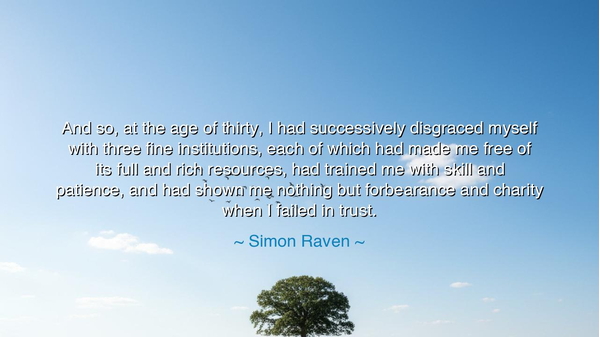
And so, at the age of thirty, I had successively disgraced
And so, at the age of thirty, I had successively disgraced myself with three fine institutions, each of which had made me free of its full and rich resources, had trained me with skill and patience, and had shown me nothing but forbearance and charity when I failed in trust.






Hear, O children of reflection, the solemn confession of Simon Raven: “And so, at the age of thirty, I had successively disgraced myself with three fine institutions, each of which had made me free of its full and rich resources, had trained me with skill and patience, and had shown me nothing but forbearance and charity when I failed in trust.” These are not the words of boast or triumph, but of a man who has looked upon his life with unsparing honesty and found there not glory, but failure—and yet, in this failure, a lesson as enduring as the wisdom of the ancients.
Raven speaks of disgrace, of being granted treasures and yet squandering them, of receiving guidance with open hands only to betray that trust. This is the story of many who are given every opportunity yet fall short because discipline and gratitude do not walk with them. It is a reminder that greatness is not given by institutions, nor by wealth, nor by talent alone. One must also bring to the table loyalty, humility, and perseverance. Without these, even the finest gifts of resources and training turn to ashes.
Consider, O listeners, the story of Alcibiades, the brilliant but reckless Athenian. He was given the training of the philosophers, the leadership of armies, and the trust of his city. Yet, by arrogance and betrayal, he squandered each gift, leaving behind a legacy tainted with suspicion and ruin. Like Raven’s tale, his story teaches us that patience, skill, and charity bestowed by others cannot save a man from himself, if his spirit remains undisciplined.
Yet within Raven’s words there is also a strange nobility: the willingness to name his failures without excuse. In confessing his disgrace, he gives us a gift greater than the false mask of triumph. For honesty, even in shame, carries the seeds of wisdom. The ancients taught that no man is so fallen that he cannot rise again, if he is willing to face his faults with courage. Raven’s confession, therefore, is not only an account of ruin, but also a lamp held high for others, so that they may avoid the stones upon which he stumbled.
The meaning of this confession stretches farther still. It reminds us that institutions, no matter how rich in knowledge or generous in spirit, cannot alone craft the character of a man. They may offer resources, they may train with patience, they may forgive with charity. But unless the individual embraces discipline, humility, and responsibility, all this forbearance will be wasted. The forging of character is not only external but internal, and without that inner flame, opportunity burns out.
The lesson for you, O hearers, is this: be mindful of the gifts given to you by family, teachers, or society. Do not take their patience and generosity for granted, nor assume their forbearance is endless. Every resource you are granted is a trust, and every trust can be broken if neglected. Do not wait until the age of thirty, or forty, to look back and see only wasted opportunities and broken promises. Instead, live now with gratitude, with discipline, and with loyalty to those who support you.
Practical wisdom follows. When you are trained, honor your teachers with diligence. When you are granted resources, use them not for vanity, but for growth. When you fail, confess it humbly and rise stronger, so that the patience of others is not squandered but rewarded. Above all, remember that trust is more precious than talent, for talent may open doors, but trust keeps them open.
Therefore, O children of tomorrow, remember Simon Raven’s confession. Let his words be a warning: do not squander the patience and charity of those who believe in you. For opportunity is a treasure, but it can be lost by disgrace. Yet let his words also be a light: even in failure, truth spoken honestly can guide others to walk more wisely. If you hold fast to gratitude, discipline, and honor, you will not only preserve the trust placed in you—you will transform it into a legacy that endures beyond your days.






AAdministratorAdministrator
Welcome, honored guests. Please leave a comment, we will respond soon